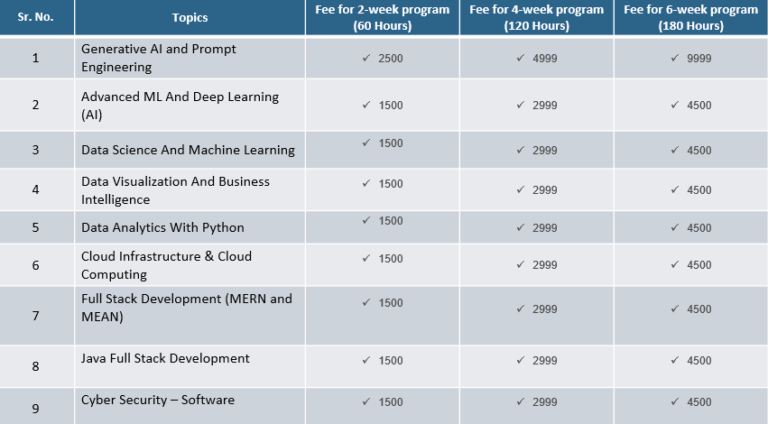Welcome to our Generative AI and Prompt Engineering Industrial Internship and Training Program, designed to empower engineering students with the knowledge and skills to harness the power of artificial intelligence (AI) for creative and innovative applications. This program is ideal for students who are passionate about exploring the intersection of AI and creativity, and who are eager to learn how to generate content using cutting-edge AI technologies.
Generative AI and Prompt Engineering Program is carefully curated to provide participants with a comprehensive understanding of the principles, techniques, and applications of generative AI. Through a combination of theoretical learning and hands-on projects, participants will delve into the fascinating world of AI-powered content generation and explore the limitless possibilities it offers.
Topics Covered-
Module 1: Introduction to Generative AI
- Overview of Generative AI and its applications
- Introduction to Generative Adversarial Networks (GANs) and Variational Autoencoders (VAEs)
- Hands-on session: Building a simple Generative AI model using TensorFlow or PyTorch
Module 2: Prompt Engineering Techniques
- Understanding prompt engineering and its importance
- Introduction to language models such as GPT (Generative Pre-trained Transformer)
- Hands-on session: Crafting prompts and fine-tuning language models for specific tasks
Module 3: Advanced Topics in Generative AI
- Exploring advanced Generative AI techniques, including StyleGAN and BigGAN
- Practical applications of Generative AI in image generation, text-to-image synthesis, etc.
- Hands-on session: Experimenting with advanced Generative AI models and techniques.
Write for complete proposal at electrocloudlabs@gmail.com | 8341957746
Advanced Machine Learning and Deep Learning Training Internship Program offer participants an in-depth exploration of advanced concepts and methodologies in the field of artificial intelligence. Whether you’re a beginner looking to deepen your understanding or an experienced practitioner seeking to sharpen your skills, our program offers a unique blend of theory and practical application to meet your learning needs.
Advanced Machine Learning and Deep Learning Training Program, designed to empower engineering students with advanced skills in data science and artificial intelligence. This program is tailored to provide participants with comprehensive knowledge and hands-on experience in machine learning and deep learning techniques, enabling them to tackle complex problems and drive innovation in various industries.
Topics Covered:
Our Advanced Machine Learning and Deep Learning Training Program cover the following topics:
Advanced Machine Learning Algorithms:
- Ensemble Learning
- Support Vector Machines (SVM)
- Bayesian Methods
Deep Learning Techniques:
- Convolutional Neural Networks (CNN)
- Recurrent Neural Networks (RNN)
- Generative Adversarial Networks (GAN)
Optimization Techniques:
- Gradient Descent Variants
- Adam Optimization
Model Evaluation and Validation:
- Cross-Validation
- Hyperparameter Tuning
Natural Language Processing (NLP):
- Word Embeddings
- Text Classification
- Sentiment Analysis
Reinforcement Learning:
- Q-Learning
- Deep Q-Networks (DQN)
Write for complete proposal at electrocloudlabs@gmail.com | 8341957746
Data Science and Machine Learning Training and internship is a program that teaches engineering students how to apply machine learning techniques to solve real-world problems using data. The program covers the basics of data science, statistics, machine learning algorithms, and practical aspects of data preprocessing, feature engineering, and model selection.
During the training, students will learn how to clean and preprocess data, engineer features, select appropriate models, and evaluate their performance. The program also focuses on teaching students how to communicate their findings effectively and interpret the results.
The internship component of the program allows students to apply the skills they have learned to real-world projects and gain practical experience in data science and machine learning. This can be a valuable experience for students interested in pursuing careers in data science, machine learning, or related fields.
Overall, the Data Science and Machine Learning training and internship program is an excellent opportunity for engineering students to develop essential data science and machine learning skills and gain practical experience in a rapidly growing field.
Write for complete proposal at electrocloudlabs@gmail.com | 8341957746
Data Analytics using Python training and internship is a program that teaches engineering students how to use the Python programming language to analyze large datasets and derive insights from them. The program covers Python programming basics, data manipulation using Python libraries such as Pandas, data visualization using libraries such as Matplotlib and Seaborn, and statistical analysis.
During the training, students will learn how to load and clean data, apply statistical methods to analyze data, and visualize data using different techniques. The program also focuses on teaching students how to communicate their findings effectively using data visualization and storytelling techniques.
The program’s internship component allows students to apply the skills they have learned to real-world projects and gain practical experience in data analytics. This can be a valuable experience for students interested in pursuing careers in data science or related fields.
Overall, the Data Analytics using Python training and internship program is an excellent opportunity for engineering students to develop essential skills in data analytics and gain practical experience in a rapidly growing field.
Write for complete proposal at electrocloudlabs@gmail.com | 8341957746
Cloud Computing using AWS training and internship is a program that teaches engineering students how to design, deploy, and manage applications and services in the cloud using Amazon Web Services (AWS). The program covers the basics of cloud computing, AWS architecture, and services such as EC2, S3, Lambda, and DynamoDB.
During the training, students will learn how to use AWS to build and deploy applications, manage resources, monitor performance, and troubleshoot issues. The program also focuses on teaching students how to optimize costs and improve security in cloud computing environments.
The program’s internship component allows students to apply the skills they have learned to real-world projects and gain practical experience in cloud computing using AWS. This can be a valuable experience for students interested in pursuing careers in cloud computing, DevOps, or related fields.
Overall, the Cloud Computing using AWS training and internship program is an excellent opportunity for engineering students to develop essential skills in cloud computing and gain practical experience in a rapidly growing field.
Curriculum:
Module 1: Introduction to Cloud Computing
- Introduction to cloud computing
- Essential Characteristics of Cloud Computing
- Service Models in Cloud computing
- Deployment models in Cloud Computing
- Introduction to AWS
- AWS Account creation &free tier limitations overview
Module 2: Linux Introduction and AWS Services
- Basics of Linux for AWS
- Linux Installation and Basic commands overview
- Web Server and Services Configurations
- Compute
- EC2 Instance Launch Wizard
- EC2 Instance Types
- Generating custom Public Key and Private keys for EC2 instances
- Security groups
- Volumes and Snapshots
- Creating customized Amazon Machine Images
- RAID Overview and RAID Configurations
- User Data and Metadata
- ElasticLoad Balancers & Health Checks
- Auto Scaling Groups
- CloudWatch
- Creating Billing Alarm and EC2 instance alarms.
- AWS CLI&EC2 Roles
- Elastic File System
- AWS Lightsail
- Elastic Beanstalk
- Placement Groups
Module 3: Logging and monitoring in Amazon S3
- Amazon CloudWatch Alarms
- AWS CloudTrail Logs
- Amazon S3 Access Logs
- AWS Trusted Advisor
- Logging configuration of Amazon S3 buckets.
- Security checks for Amazon S3 buckets that have open access permissions.
- Fault tolerance checks for Amazon S3 buckets that don’t have versioning enabled, or have versioning suspended.
Module 4: Okta tool for Identity and Access Management
- Step 1: Enable provisioning in AWS SSO
- Step 2: Configure provisioning in Okta
- Step 3: Assign access for users and groups in Okta
- (Optional) Step 4: Configure user attributes in Okta for access control in AWS SSO
- (Optional) Passing attributes for access control
- Troubleshooting
Module 5: Route 53
- DNS Records overview
- Routing Policies
- Hosting sample Website and configuring Policies
- Simple Routing Policy
- Latency Routing Policy
- Failover Routing Policy
- Weighted Routing Policy
- Geolocation Routing Policy.
Module 6: Database
- Launching a RDS Instances (MySQL, MSSQL & Aurora)
- Multi-AZ & Read Replicas for RDS instances
- DynamoDB
- Redshift
- Elastichache
- Database Migration Service and Schema conversion tool
Module 7: VPC (Virtual Private Cloud)
- Networking Basics
- Creating custom VPCs and custom Subnets
- Network ACL’s
- Route Tables & IGW
- VPC Peering
- Flow log creation
- VPN Configuration with AWS (OpenVPN)
Module 8: Application Services
- Simple Email Service
- Simple Queue Service
- Simple Workflow Service
- Simple Notification Service
- SMS – Server Migration Service
- Migrating server from on-premises to cloud
- Cloud Formation
- Directory Services and Adding EC2 instance to Domain
- AWS TCO Calculator and Simple Monthly calculator
Module 9: Project Work and report submission.
Please get in touch with us for more details 8341957746





